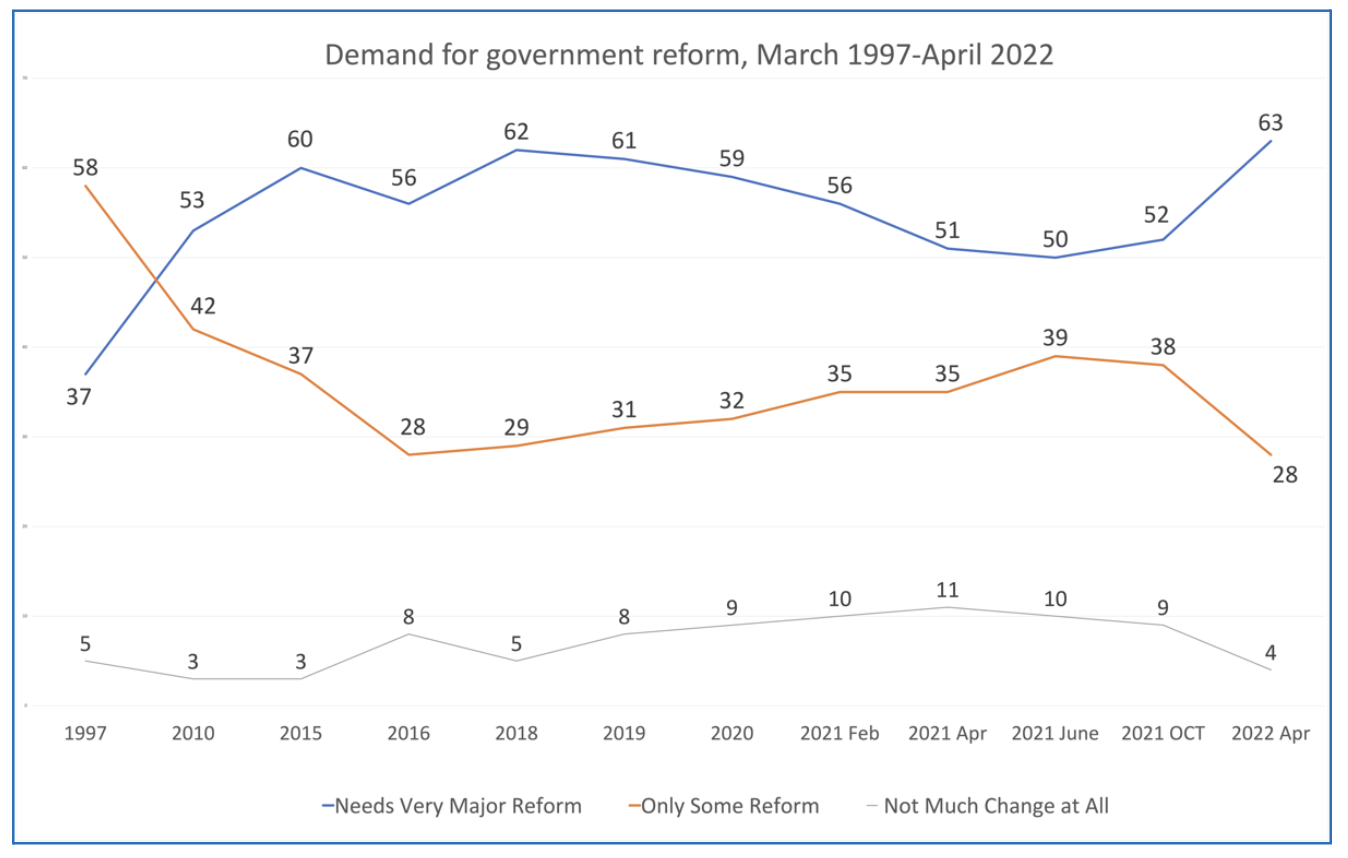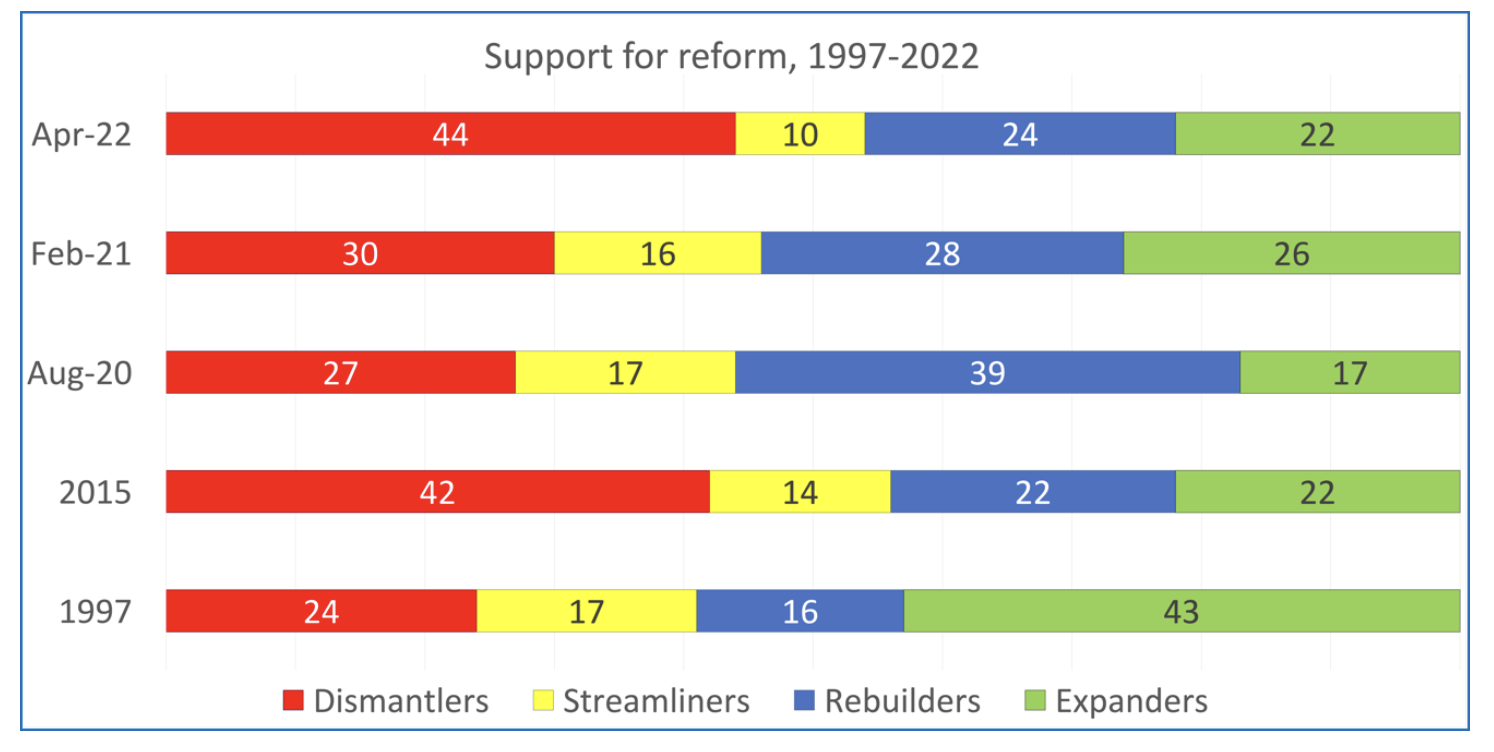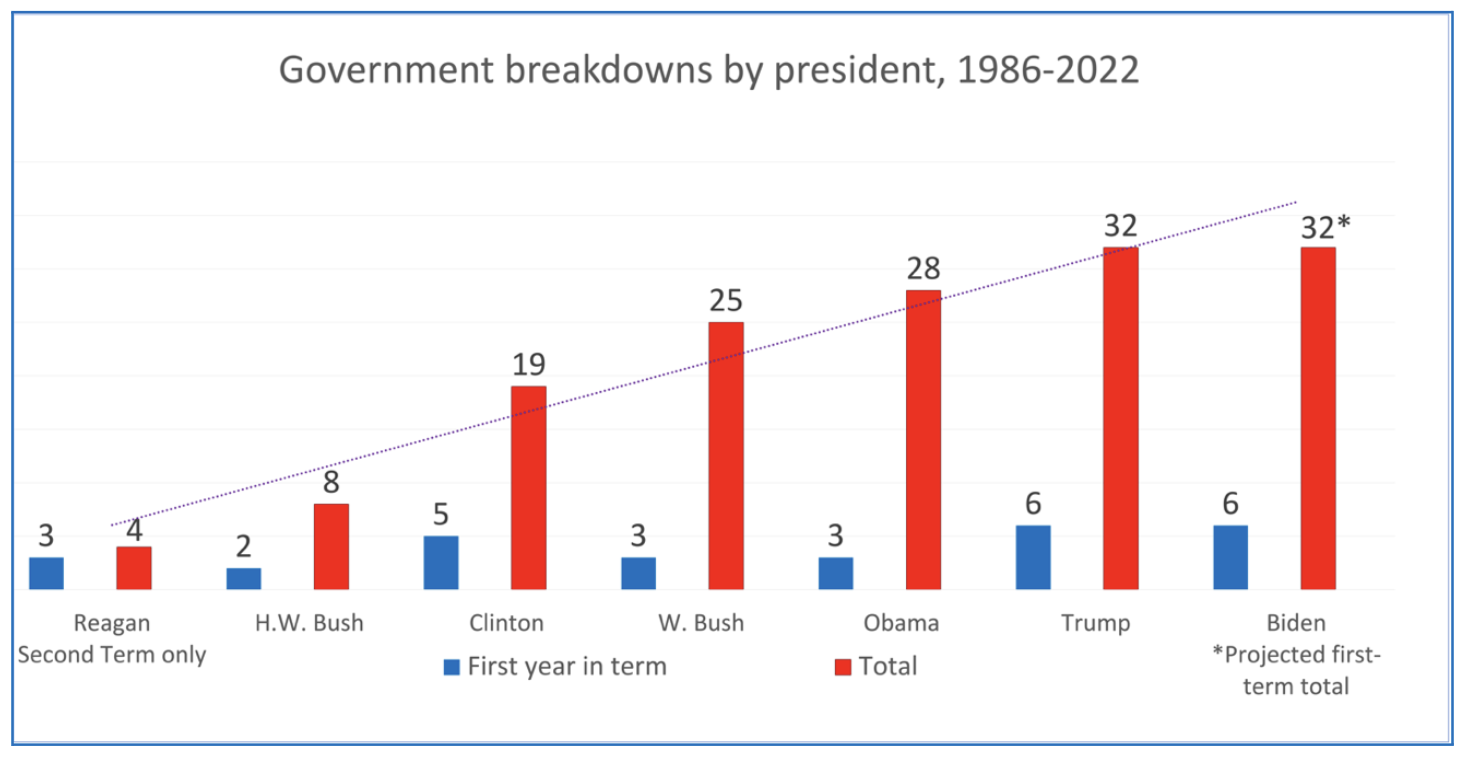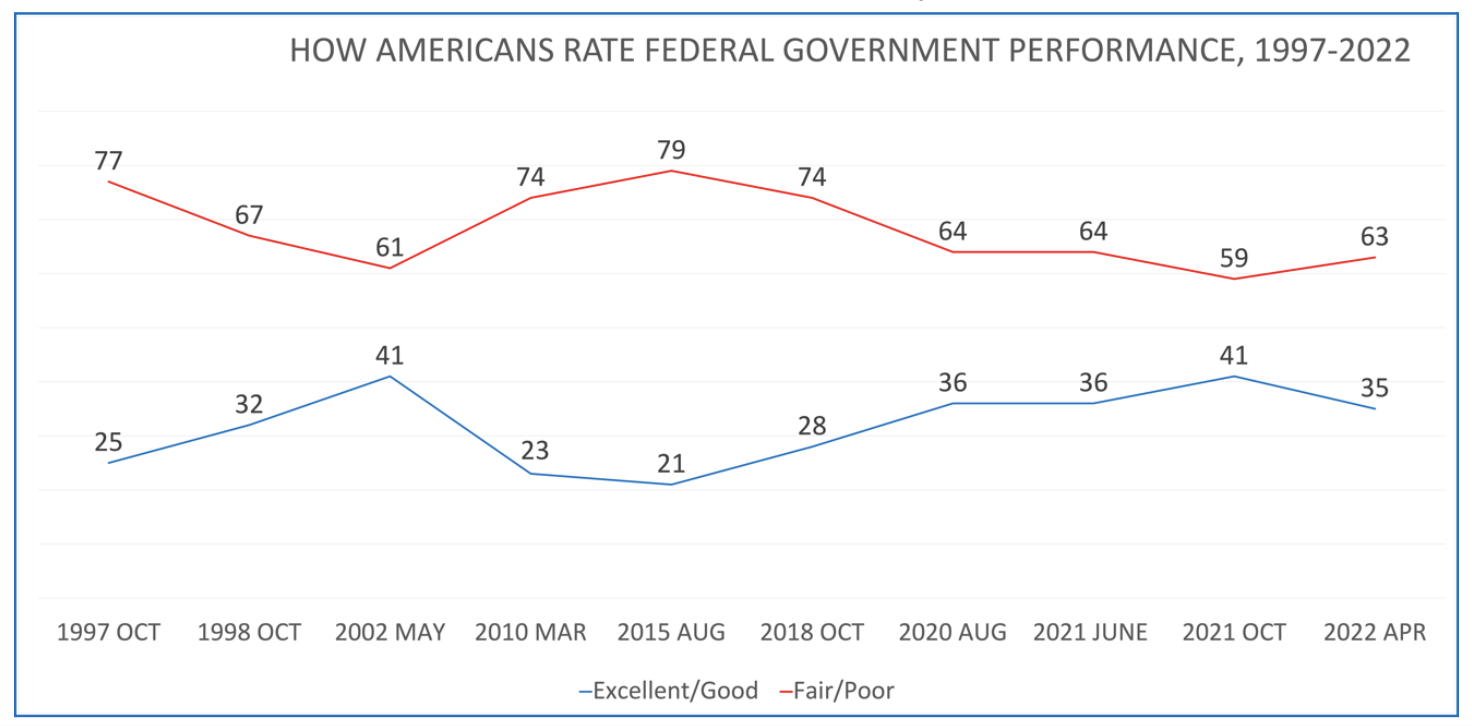
Sean Gladwell/Getty
More Americans Want 'Very Major' Government Reform
With the number of federal breakdowns piling up, the public is deeply divided on the size and role of government.
Americans head into the 2022 midterm election season with record-setting doubts about the federal government’s faithful execution of the laws. Public demand for comprehensive government reform is at a 20-year high, while confidence in government has dropped to a historic low. The thickening of government with layers of management has continued unabated, and support for government careers has slipped below 40 percent. Absent large-scale repairs to renew and repair and renew the federal sprawling federal bureaucracy, Americans have good reason to ask whether the government can deliver on the promises it makes.
Until Washington takes the crisis seriously, Americans should prepare for more government breakdowns. Despite decades of grand reform efforts dating back to Harry Truman’s post-World-War II reorganizations, Jimmy Carter’s civil service modernization plan, Ronald Reagan’s war on waste, Bill Clinton’s search for a government that works better and costs less, and Joe Biden’s 2011 plan for a 21st century regulatory system, the federal government remains vulnerable to major malfunctions, predictable failures, design flaws and overconfidence.
As the midterm elections approach, six factors are clear:
- The demand for “very major” government reform is rising
- Americans are deeply divided about the size of government
- The number of government breakdowns is accelerating
- The thickening of government continues
- Biden’s job rating for running the federal government is fair to poor
- Support for careers in government is falling
Major Reform
In 1997, when Clinton began his second term in office, 58% of Americans agreed the federal government was “basically sound and only needed some reform.” The economy was strong, the world was at peace, and Clinton remained popular deep into his presidency.
This era of confidence was short-lived, however, as public demand for “very major reform” increased from 37% in 1997, when the Pew Research Center first asked the question, to 60% two decades later. Meanwhile, the number of Americans who said the government is “basically sound and needed only some reform” dropped to 28%.

The demand for reform is broadly linked to the recent increase in government breakdowns, declining confidence in government more generally, and public dissatisfaction with the way the country is headed. Americans have a long history of following breakdowns very closely and have long memories of government tragedies such as the 9/11 terrorist attacks, the space shuttle Challenger accident, the sluggish response to Hurricane Katrina, vaccine shortages, medical supply issues and economic stimulus checks sent to dead people.
Where Americans stand on demand for government reform depends on party control of government. Democrats tend to favor very major reform when Republicans are in power, while Republicans return the favor when Democrats are in charge:
- In March 2010, with a Democrat in the White House, 66% of Republicans favored very major reform, compared with 43% of Democrats.
- In July 2014, with a Democrat still in the White House, 59% of Republicans favored very major reform, compared with 37% of Democrats.
- In June 2018, with a Republican in the White House, 54% of Republicans favored very major reform, compared with 63% of Democrats.
- In April 2022, with a Democrat in the White House, 84% of Republicans favored very major reform, compared with 49% of Democrats.
Party identification is not the only anchor of demand for reform—ideology also plays a role, as do recent events and scandals. Partisans often give the benefit of the doubt to the president and party, but breakdowns provoke a much deeper response.
Deep Division
The demand for very major reform and preferences for big or small government can be sorted into four broad philosophies: “expanders” favor a bigger government and only some reform; “streamliners” prefer a smaller government and only some reform; “rebuilders” want a bigger government and very major reform; and “dismantlers” seek smaller government and very major reform.

At first glance, Biden’s $1.8 trillion Build Back Better plan unveiled in 2021 seemed tailor-made to attract big-government expanders. But expanders ended the campaign with little momentum toward their bigger-government-that-delivers-more agenda and didn’t earn a bounce even with an expander in the White House. Meanwhile, the rebuilders lost almost half of their support between August and April, while the streamliners settled at a recent low.
Measured in shares of support, the dismantlers had the strongest reaction to the end of the Build Back Better plan. Starting with a 27% share just before the 2020 election, the dismantlers rose to a 44% high by April 2022. The demise of Build Back Better may be bringing the rebuilders and dismantlers together in support of common sense government reforms and the deep repairs needed to address the rising number of government breakdowns. If doing so jump-starts the economy, as Peter Schuck and Philip Howard argued in early 2021, all the better for winnowing the needless rules that undermine federal performance.
For now, Biden continues to court the rebuilders with promises to end the bureaucratic runarounds that impose steep “time taxes” on government services. Skeptics might be more enthusiastic about such pledges if Biden rebooted his 2011 campaign to cut government waste and his promise to “hunt down and eliminate misspent tax dollars in every agency and department across the federal government.” Shorter lines at Social Security Administration offices and faster internet access offer little comfort to Americans who worry about economic turmoil and potential tax increases.
More Breakdowns
Federal government breakdowns, defined as policy or management failures that produce high levels of news coverage and reader interest, have risen in every administration since I started counting them in 1986. Although the news industry often promotes stories about high-profile failures for ratings, the number of breakdowns listed in the Pew Research Center’s News Interest Index has grown steadily over time.
Some of the failures were triggered by legislative hubris, underfunding, and outright sabotage. The question is whether there are patterns across the 123 breakdowns on my list that might lead to fewer failures in the future. Were policy designs at fault? Was political pressure to blame? Were major malfunctions dismissed? Were shortcuts at the center?
The answers can only come from an analysis of the facts surrounding each incident. The data is easy to assemble—the 123 breakdowns have led to dozens of blue-ribbon commissions, congressional investigations, research studies, best-selling histories, and teaching cases. The challenge is to use the findings to develop simple questions that might provoke second thoughts before the policies are enacted, programs implemented, budgets scrubbed and countdowns begun.

Each of the past three presidents started their first year in office with a short list of breakdowns that multiplied over time. Trump faced six more breakdowns in his second year, five in his third, and 16 in a final year that began with early missteps in the fight against Covid-19 and ended with the Capitol Hill riots.
Biden faced six breakdowns in a first year that started with a border-crossing surge, the Colonial Pipeline internet hack in May 2021, rising crime and gun violence into summer, a supply-chain shutdown, increasing inflation by July, and the bloody Afghanistan withdrawal in September. He added two more breakdowns to his list by mid-summer, 2022 with a baby formula shortage that started in May and a torrent of summer flight delays and cancellations by July.
Thicker and Thicker
According to the online directories published by LeadershipConnect in 2020, Biden took control of 83 layers of presidential appointees and 5,000 jobs on Inauguration Day.
He inherited hundreds of lower-level “title-riders” who thicken the hierarchy with second titles such as “associate deputy assistant secretary,” “assistant deputy undersecretary,” “deputy associate assistant commissioner,” “associate principal deputy assistant secretary,” “deputy chief of staff,” and “assistant deputy chief of staff.” The federal government has never had more layers of leaders nor more leaders per layer, confirming Trump’s complaint that “it’s just people over people over people.”
Congress has the primary role in flattening the hierarchy, but will not act without presidential demand. Despite constant nudging by the Government Accountability Office, Congress continues to ignore the outdated management laws and systems that have fueled so many government breakdowns. Lawmakers averaged five major government reform bills per year during the Nixon, Carter, and Clinton administrations, but throttled back to just two bills per year over the last 20 years.
Poor Performance Ratings
Having begun his presidency in January facing a migrant border crisis and continued pandemic chaos, Biden ended his honeymoon six months later with a dismal 69% fair/poor rating for running the federal government and its programs. Although his negative rating dropped slightly to 57% the following October, the fair/poor rating bounced back up to 63% in April 2022.
Meanwhile, Biden’s excellent/good ratings echoed the disappointments, with a 31% rating in June, 44% in October, and a drop back to 35% by April. His early support eroded with a growing list of breakdowns before the ratings began to slip again as American troops left Afghanistan.
More recent surveys also show broad public concern about the president’s performance, including a May 2022 CBS News poll in which 65% of Americans said Biden was “slow to react when important things come up.”
Public ratings of the federal government’s performance show continued cause for concern. The federal government has only breached the 40-percent mark twice since 1997 and has shown no momentum toward a lift anytime soon.

Pick Another Career
The percentage of Americans who said they would want a son or daughter to pursue a career in government dropped from 56% in 2010 to just 39% in April 2022, as the number of respondents who did not answer the question increased. Republicans and independents were most likely to say “no” to a government career and Democrats most likely to say “yes,” while conservatives and moderates were the most likely to say “no,” and liberals again most likely to say “yes.”
The four reform philosophies also shape support for careers in government. Asked last April whether they would recommend a career in government to a son or daughter, 77% of the dismantlers answered “no,” “don’t know,” or refused the question, while 36% of the streamliners, 52% of the rebuilders, and 54% of the expanders answered “yes.”
Alongside the 11-point drop in the number of Americans who would recommend a career in government to a son or daughter, the number of null answers rose 13 points between 2021 and 2022, suggesting that Americans are becoming more uncertain about the value of careers in government.
Moreover, even the most enthusiastic expanders might reconsider their recommendations if they knew how long the hiring process takes, how many federal employees say performance has little impact on pay and promotions, and how few say creativity and innovation are encouraged in their organizations. Recent studies also highlight the impact of anti-government rhetoric, economic uncertainty, and benefit cuts on the attractiveness of government careers.
A Call to Reform
Biden rarely talked about the need for government reform during his years in the Senate and bluntly rejected the topic in 2008 when Obama asked if he would be “very happy” to reorganize the federal government as part of his vice-presidential portfolio. “No,” he answered. “That’s not what I want to do.”
Biden did accept occasional management chores, overseeing the implementation of Obama’s 2009 stimulus package and chairing the 2011 “Campaign to Cut Waste.” Along the way, Biden developed expertise in selling excess property, closing small government offices, harvesting improper payments, cutting government travel budgets and hunting down Medicare fraud.
Although the Biden-Harris 2021 Management Agenda Vision has won plaudits for its commitment to an “equitable, effective and accountable government that delivers results for all,” the agenda has yet to outline an implementation plan that might appeal to the two-thirds of Americans who favor very major reform. Biden’s disapproval rating already stood at 52% when the vision was released on Nov. 19 and has barely moved since. His agenda might be a big deal to public administration experts but is still far from the very major reform Americans want. It also lacks the punch that wars on government waste, budget reductions and civil service cuts provide.
Vice President Al Gore’s National Performance Review took a different course. “We cut government the right way,” reinventing government guru Elaine Kamarck told Congress in 2013, “by eliminating what wasn’t needed—bloated headquarters, layers of managers, outdated field offices, obsolete red tape, and rules." By the end of the first year, Gore, Kamarck, and the rest of the reinventing team had cut 78,000 federal management jobs, issued 1,250 directives toward improved performance, harvested $136 billion in waste, and added three dozen management reforms to the federal code.
Elected as the “big spender America wants,” as Paul Krugman wrote after his inauguration, Biden must now become the Mr. Fixit Americans say the federal government needs. He may not be happy in the role, but it is now on his agenda whether he likes the work or not. Although Americans often express favorable opinions toward highly visible agencies such as the Postal Service, about a fifth of them are angry toward the federal government, another 60% are frustrated, and just 22% are content.
Trust in the federal government is unlikely to rebound without significant reform. According to the Pew Research Center, nearly half of Americans believe the federal government faces more difficult challenges today than in the past, but 40% say dealing with federal government agencies is often not worth the trouble.
Americans remain unsparingly negative toward the federal government’s job performance. In April and May 2022, just 32% percent said they had a favorable opinion of the federal government, compared with 54% and 66% who felt the same about their state and local governments respectively.
These findings suggest that breakdowns are more an accelerant of declining trust than a cause. Although each breakdown creates new doubts about government performance, they are almost always traceable to bureaucratic failures that can and should have been addressed long before the federal government embraced a new endeavor.
Biden owns the breakdown curve now. But with his general lack of interest in government management, the pace may increase, taking its toll in the 2020 midterms and beyond.
Paul C. Light is the Paulette Goddard Professor of Public Service at New York University's Robert F. Wagner School of Public Service.







